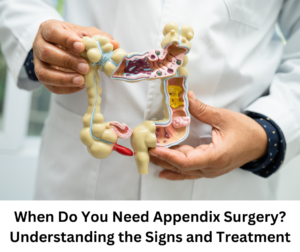Introduction
The appendix, a small, tube-shaped pouch attached to the large intestine, has long been a subject of medical curiosity. Though it has no known essential function, it can cause significant health problems when inflamed, a condition known as appendicitis. Recognizing the signs of appendicitis and knowing when to seek medical intervention is crucial. This article provides a comprehensive overview of when appendix surgery, particularly laparoscopic appendectomy, is necessary, and highlights the expertise of the best laparoscopic surgeon in Faridabad.
What is Appendicitis?
Appendicitis is the inflammation of the appendix, typically caused by a blockage. This blockage can be due to a variety of reasons, including:
- Fecal matter: Hardened stool can obstruct the opening of the appendix.
- Infections: Gastrointestinal infections can lead to swelling of lymph nodes, causing blockages.
- Tumors: Though rare, tumors can also block the appendix.
When the appendix becomes inflamed, it can fill with pus, causing severe pain and potentially leading to rupture if not treated promptly.
Symptoms of Appendicitis
Recognizing the symptoms of appendicitis is the first step toward seeking timely treatment. Common symptoms include:
- Abdominal pain: Typically begins around the navel and then shifts to the lower right abdomen. The pain usually intensifies over time.
- Loss of appetite: A sudden loss of appetite often accompanies the pain.
- Nausea and vomiting: These symptoms can follow the onset of abdominal pain.
- Fever: A low-grade fever may develop as the body’s immune response to the infection.
- Swelling and tenderness: The lower right side of the abdomen may become swollen and tender to the touch.
- Changes in bowel habits: Diarrhea or constipation can occur in some cases.
Diagnosis of Appendicitis
To diagnose appendicitis, doctors typically rely on a combination of physical examinations, medical history, and diagnostic tests, including:
- Physical exam: The doctor will check for tenderness in the lower right abdomen and may apply gentle pressure to identify the source of the pain.
- Blood tests: These can reveal signs of infection, such as an elevated white blood cell count.
- Urine tests: To rule out urinary tract infections or kidney stones.
- Imaging tests: Ultrasound or CT scans can provide detailed images of the appendix to confirm the diagnosis.
When is Appendix Surgery Needed?
Appendix surgery, or appendectomy, is the standard treatment for appendicitis. The surgery can be performed using two main techniques:
- Open appendectomy: Involves a single, larger incision in the lower right abdomen.
- Laparoscopic appendectomy: Involves several small incisions and the use of a laparoscope (a thin tube with a camera and light).
Benefits of Laparoscopic Appendectomy
Laparoscopic appendectomy offers several advantages over the open procedure, including:
- Smaller incisions: Leading to less scarring and faster healing.
- Reduced pain: Post-operative pain is generally less severe.
- Shorter hospital stay: Most patients can go home the same day or the next.
- Quicker recovery: Patients can return to normal activities sooner.
Seeking the Best Laparoscopic Surgeon in Faridabad
Choosing the right surgeon for your appendectomy is crucial for ensuring a successful outcome. Faridabad is home to some of the best laparoscopic surgeons, known for their expertise and advanced surgical techniques. When selecting a surgeon, consider the following factors:
- Experience and qualifications: Ensure the surgeon has extensive experience in performing laparoscopic appendectomies.
- Patient reviews: Look for positive testimonials from previous patients.
- Hospital affiliation: Choose a surgeon affiliated with reputable hospitals known for high standards of care.
- Consultation: Schedule a consultation to discuss the procedure, recovery, and any concerns you may have.
The Procedure: What to Expect
A laparoscopic appendectomy generally involves the following steps:
- Anesthesia: The patient is given general anesthesia to ensure they are asleep and pain-free during the procedure.
- Incisions: The surgeon makes several small incisions in the abdomen.
- Insertion of laparoscope: A laparoscope is inserted through one of the incisions, providing a live video feed of the internal organs.
- Removal of appendix: Special surgical instruments are inserted through the other incisions to remove the appendix.
- Closure: The incisions are closed with sutures or surgical tape.
Post-Operative Care and Recovery
After a laparoscopic appendectomy, patients typically experience a relatively smooth recovery. Key aspects of post-operative care include:
- Pain management: Mild pain and discomfort are common, and pain relievers may be prescribed.
- Activity restrictions: Patients are advised to avoid strenuous activities for a few weeks.
- Diet: A gradual return to a normal diet is recommended, starting with clear liquids and progressing to solid foods as tolerated.
- Follow-up: A follow-up appointment with the surgeon ensures proper healing and addresses any concerns.
Complications and Risks
While laparoscopic appendectomy is generally safe, it is important to be aware of potential risks and complications, including:
- Infection: As with any surgery, there is a risk of infection at the incision sites.
- Bleeding: Some bleeding may occur during or after the surgery.
- Hernia: Rarely, a hernia can develop at the incision sites.
- Adhesions: Scar tissue may form, causing internal organs to stick together.
Conclusion
Appendix surgery is a critical procedure for treating appendicitis and preventing serious complications. Laparoscopic appendectomy, performed by the best laparoscopic surgeon in Faridabad, offers numerous benefits, including smaller incisions, reduced pain, and faster recovery. Recognizing the symptoms of appendicitis and seeking prompt medical attention can make a significant difference in the outcome of the surgery. If you or a loved one experiences symptoms of appendicitis, consult with a qualified laparoscopic surgeon to discuss the best treatment options.
By choosing an experienced surgeon and following the recommended post-operative care, you can ensure a smooth recovery and return to normal life as quickly as possible.


